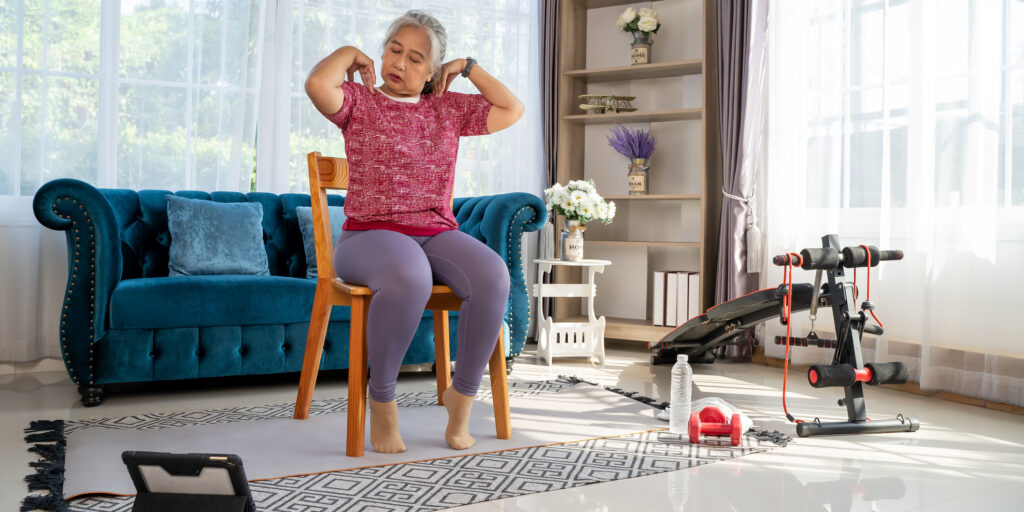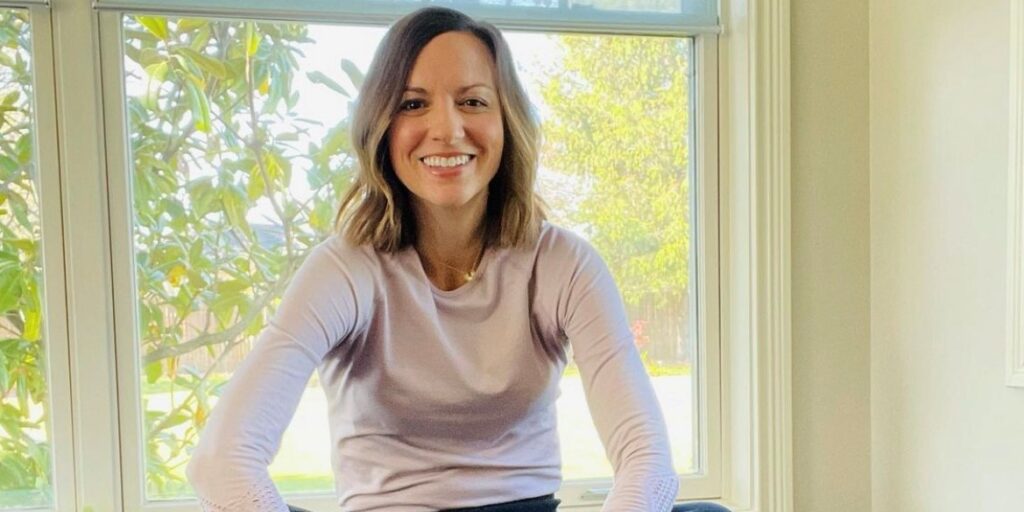
5 Ways to Manage Back-to-School Stress
By Elizabeth Millard | Tuesday, August 23, 2022
5 Second Summary
Back to school got you stressed? These five strategies will help you manage anxiety and thrive this school year.
The start of a new school year can be stressful for the whole family, especially when juggling healthcare appointments, IEP plan meetings, school supply shopping, and assembling a back-to-school wardrobe.
At the same time, stress can make neuromuscular conditions worse. For example, research published in the journal Developmental Biology found that stress can induce muscle degeneration, making them less adaptive to temperature changes. Another study in Frontiers in Physiology found that stress disorders could affect nerve function, which can already be a struggle with some neuromuscular diseases.
That means finding strategies to help manage stress and anxiety is crucial. What works best is usually an individual choice. Here are five ideas to help you sail through back-to-school season and thrive all year long.
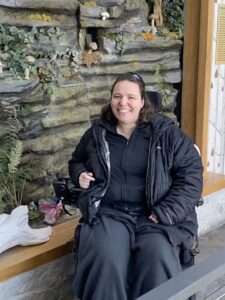
Crystal Killian began practicing adaptive yoga after her mitochondrial myopathy diagnosis.
1. Adaptive yoga
You might believe that yoga is out of reach if you have mobility limitations, but the opposite is true, says 40-year-old Crystal Killian, who has mitochondrial myopathy (MM) and lives near Philadelphia. Since she was young, Crystal has loved how yoga clears her head — but after she was diagnosed in 2008 and had trouble with standing and transferring her weight, she thought she’d have to give it up. Fortunately, she was able to do even more.
“When I found adaptive yoga, it was a transition since it involves people helping me to get into different poses, but I discovered what I appreciated about yoga is still there,” she says. “I still have better awareness of my body.”
For 48-year-old Noblesville, Indiana, resident Amy Shinneman, who lives with Bethlem myopathy, a form of congenital muscular dystrophy, trying chair yoga led to an adaptive yoga class, and she found it relaxing from the start.
“I found that I could calm my anxieties and concerns almost immediately, which is huge when you have muscular dystrophy,” Amy says. “This condition can be mentally draining, and it’s not easy to find a way to handle stress and get movement at the same time, so when you find that balance, it’s very rewarding.”
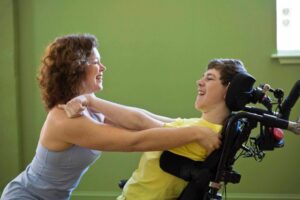
Kerri Hanlon learned about adaptive yoga to help her son, who has cerebral palsy.
That’s exactly the feeling adaptive yoga should provide, says Kerri Hanlon, a yoga teacher and owner of Yoga Home in Conshohocken, Pennsylvania, who started learning about adaptive yoga to
help her son, who has cerebral palsy.
“For my students who have conditions like muscular dystrophy, they usually have years of built-up stress because there’s so much to manage,” Kerri says. “Yoga shouldn’t be another source of anxiety. Instead, a big aspect is accepting ourselves as we are and learning how movement and deep breathing can assist in moving with intention and appreciation.”
2. Meditation
When Crystal can’t do yoga, she uses focused breathing and awareness in a meditation technique called a body scan. That involves bringing your attention to your body and noticing how each part of the body feels, down to individual toes.
Other forms of meditation involve different breathing techniques, visualization, and guided meditation with an app. (See “Virtual stress management” below.) Crystal finds that regular meditation has relieved her stress about her condition.
“It helps me cope with the frustration and aggravation that comes with being in the hospital, and in general,” she says. “Meditation also allows me to be in my body in a way that’s different from movement. It’s a true mind-body connection that reduces stress.”
3. Mindfulness
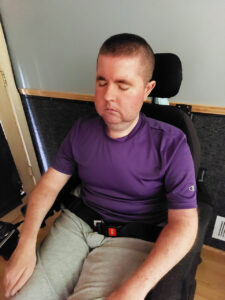
Mark Eisenberg practices meditation regularly and strives to incorporate mindfulness into his everyday life.
Although mindfulness and meditation are often used interchangeably, they’re different in approach, says 29-year-old Mark Eisenberg, who lives with Duchenne muscular dystrophy (DMD).
“Meditation is a practice, but mindfulness is more of a way of life,” he says. “It’s similar to how you might choose a few specific foods that are good for you, but overall you’re trying to create a habit of eating healthier.”
By appreciating the present moment and employing more positive thinking, Mark has been able to reduce the stress and anxiety he feels daily. Examples of mindful activities include eating slower and paying attention to your food, taking time to observe nature outside your window, and using uplifting affirmations or phrases to “rewire your brain,” Mark says.
“The biggest benefit is that I don’t feel as distracted and preoccupied,” he adds. “Because of that, my addiction to stimulation like social media started to dissolve, and I could just relax my mind instead. I’m comfortable now doing nothing.”
4. Natural remedies
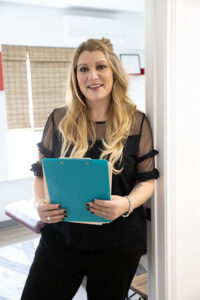
Tenesha Wards, DC, recommends natural remedies that can improve sleep and relieve stress.
In finding more ways to de-stress and alleviate anxiety, remedies like aromatherapy, herbal tea, acupuncture, and even healthy foods can all have an effect, according to Tenesha Wards, DC, a holistic doctor and medical director at Infinity Wellness Center in Austin, Texas.
For years, she’s watched how her aunt, who has myotonic dystrophy (DM), deals with everyday tasks and frustrations, and she sees a similar pattern in her patients — physical and mental exhaustion can lead to burnout, and that requires a breadth of strategies to get back into balance.
Trying a simple remedy to improve sleep, like drinking chamomile tea before bedtime or applying lavender essential oil to your pulse points, might be a helpful first step. She also suggests trying adaptogenic herbs, which are plants containing compounds that help the body regulate the stress hormone cortisol more effectively. Dr. Wards’ favorites are ginseng, ashwagandha, and rhodiola, which may be available as supplements or tinctures.
Of course, check with your doctor before taking anything that might conflict with your medications.
Dr. Wards says stress relief could come from ensuring you’re drinking enough water. “Sometimes, we forget that simple changes can have profound effects,” she says. “Trying remedies designed to help you relax, have better digestion, sleep well, and alleviate muscle aches can all go a long way for those with neuromuscular diseases.”
5. Journaling
Another important strategy is understanding what’s causing stress and anxiety in one’s life. For that, journaling can be beneficial. Mark uses the technique to get everything out of his brain — that can make his mind less busy, and it increases a sense of mental rest.
“Before journaling, my brain would almost hurt from thinking so much all the time,” Mark says. “With journaling, I can get it out and have a break. And when I combine that with meditation and mindfulness, it becomes a powerful way to support myself and my mental health.”
Elizabeth Millard is a freelance writer in northern Minnesota.
Virtual Stress Management
What if you can’t go to a class or don’t know where to start? Fortunately, several apps and services can help you manage stress and thrive. Here are some to consider:
- Adaptive Yoga Live: Find live and recorded adaptive yoga classes.
- Calm: This app aims to improve health and happiness by helping you reduce stress and anxiety, and improve sleep and focus.
- Happify: With science-based games and activities, this app is designed to help you change your habits and build more positive thoughts and feelings.
- Headspace: This app includes daily meditations, guided visualizations, and even sleep stories to help you fall asleep faster.
- Yoga Home: This Pennsylvania yoga studio offers online yoga classes for various levels of ability.
- Personal Zen: Focused solely on reducing stress and anxiety, this app is centered around building emotional resilience and reducing anxiety.
Next Steps and Useful Resources
- Find resources at MDA’s Mental Health Hub to support your mental health needs.
- Exercise can be a mood booster. Learn how people with neuromuscular diseases are reaping the benefits of exercise.
- Getting ahead of our finances can alleviate stress. Check out some smart ways to use savings accounts.
- Find K-12 and higher education information and resources in MDA’s Access to Education Workshops.
TAGS: Amy, Featured Content, Mental Health, Web Exclusive
TYPE: Featured Article
Disclaimer: No content on this site should ever be used as a substitute for direct medical advice from your doctor or other qualified clinician.



